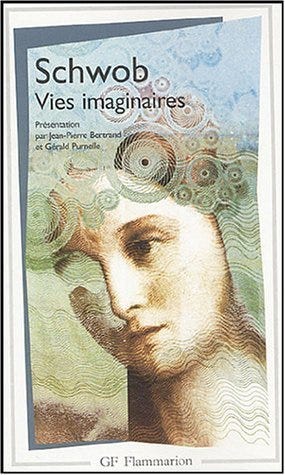Beautiful little jewels of stories, of varying hue and setting. Fanciful mini-biographies, richly imagined, of diverse tone and mood. The masks of Tragedy and of Comedy, sometimes interchanged within the same tale. Wee concertos of shifting arrangement, from the Renaissance style to the Baroque, to the Classical and then to the Romantic, and on to Modernism. Marcel Schwob may have been taught in the Modernist school but his music embraces all movements, all lives, imaginary and otherwise.
These stories, or essays, or trifles, or charming, knowingly plagiaristic oddments, were written near the end of the 19th century and collected in 1896. And yet their irony and romanticism, their frequent nihilism and their occasional hopefulness, feel so modern.
They are all excellent, but my favorites were the sardonic, mind-expanding "Lucretius" and the bit of fabulist whimsy "Suffrah" and the mean-spirited, over the top "Cyril Tourneur" and the four pirate tales that close the book on a mordant and distinctly anti-piratical note. The final story is also excellent, if rather self-excoriating: "Messrs. Burke and Hare" implicitly compares the author's recounting of "imaginary" lives to the dark deeds of a pair of murderers who induce their victims to tell the story of their lives before murdering them, and later, changing tactics, enjoy making a dramatic miming mockery of those lives while murdering them.
I beg to differ, Marcel! Surely you're not as bad as that.
♪ ♫ ♬
"Empedocles" - in Ancient Sicily, a healer and resurrectionist is worshipped as a god; inevitably, the flames of Mt. Etna shall prove he died a mortal.
"Herostratus" - in Ancient Ephesus, an angry virgin shall bring fire to the temple of Artemis; and so proceeds to an evitable conclusion of torture and erasure.
"Crates" - in Ancient Thebes, a philosopher shall live as a dog in the streets; as with all good dogs, he shall rank affection over hygiene.
"Septima" - in Ancient Hadrumentum, a spurned slave shall beg the dead to intercede; as with all such lovelorn lovers, only death can cool their heat.
"Lucretius" - in Roman Times, a Stoic nobleman loves a murderous African; a lesson is learned about atoms swelling and joining and retracting, much the same as love and life.
"Clodia" - in Roman Times, a noblewoman is accustomed to influence and incest; a lesson is learned about how the toxic will poison their own stock, their own selves.
"Petronius" - in Roman Times, an aesthete moves from languour to spinning tales of adventure to wanderlust; a lesson is learned about how life is fullest when at its dirtiest.
"Suffrah"- in Fabled North Africa, a wizard tricked by Aladdin reads signs in the sand; alas, the gift of immortality may mean a living death.
"Fra Dolcino" - in the Holy Roman Empire, a monk takes the apostlic path; alack, the Lord's Word will not protect a band of thieving apostles.
"Cecco Angiolieri" - in Renaissance Italy, a malcontent nurses grievances against his father and against Dante; the nature of Chaos shall provide him a tumultuous life.
"Paolo Uccello" - in Renaissance Italy, a painter devotes all of his attention to creating the perfect series of lines; the nurture of Order shall provide him a life devoid of life.
"Nicolas Loyseleur" - in Medieval France, a judge tricks and lies to Joan of Arc; torture is his recommendation but it is the judge himself who shall end tormented.
"Katherine the Lacemaker" - in Medieval France, a woman's life is a downward spiral of degradation; a tortured life shall end in mud, in murder.
"Alain the Kind" - in Medieval France, a child of war shall become as those who kidnapped him; a life of thievery and murder shall eventually end in torture.
"Gabriel Spenser" - in Elizabethan England, a brothel's brat becomes a fetching drag actor; fate will declare that identity may change, but death comes to all.
"Pocahontas" - in the New World and the Old, a king's child becomes rescuer then captive then honored guest; destiny will decide that identity may change, but death comes to all.
"Cyril Tourneur" - in Jacobean England, a dramatist's life shall be dramatised; it is clear that Marcel Schwob had much admiration but little love for this strange moralist. LOL!
"William Phips" - in treacherous waters, a treasure hunter shall attain his goal; pity the man who achieves their goal and still has some life yet to live.
"Captain Kidd" - in treacherous waters, a gentleman shall become a predator; pity the pirate's victims, and pity the pirate himself, haunted by his prey.
"Walter Kennedy" - in treacherous waters, a roustabout shall become a pirate captain; pity the impatient corsair who minces words with a patient Quaker.
"Major Stede Bonnet" - in treacherous waters, a gentleman of Barbados shall become as his idol Blackbeard; pity the fool whose childish dreams encounter an adult world.
"Messrs. Burke and Hare" - in treacherous London, two knaves listen to stories and end those storytellers' lives; and so this author Schwob finds certain... commonalities.
Discussion about this post
No posts






At first, I was jumpscared by the photo but it's all worth it for the book selection. I look forward to reading this thank you for sharing.